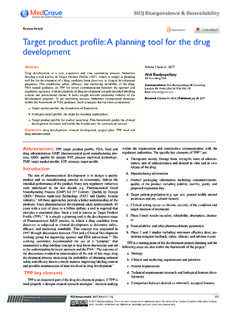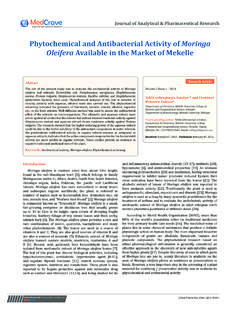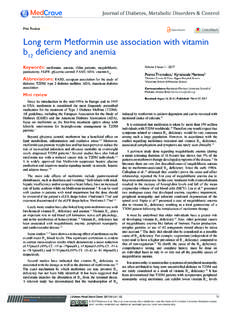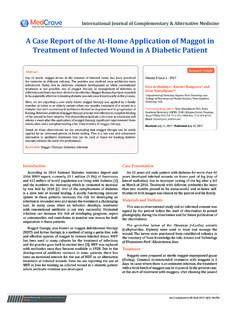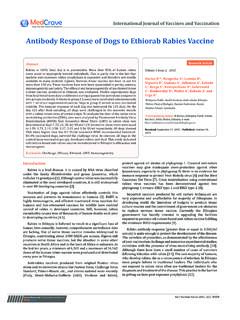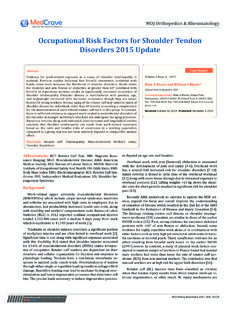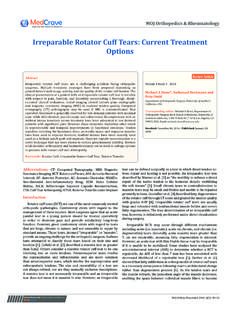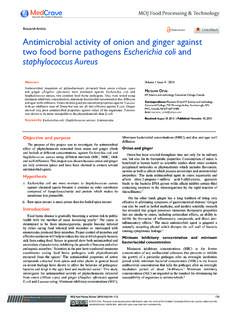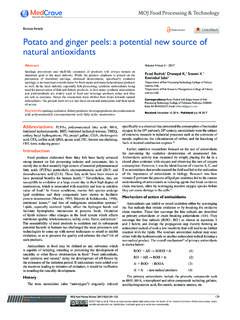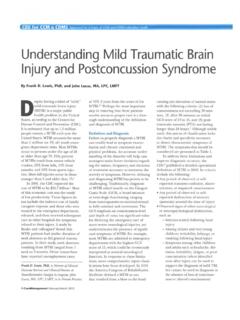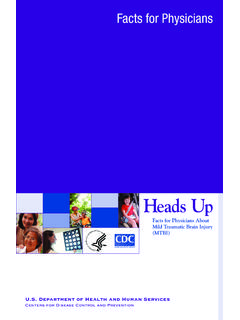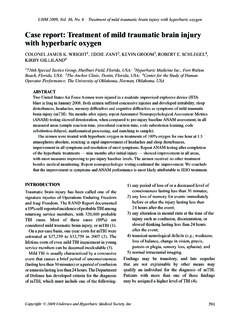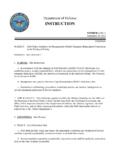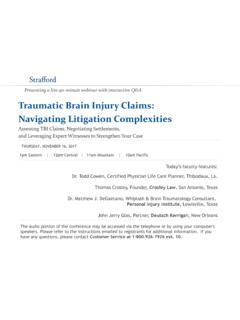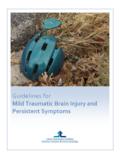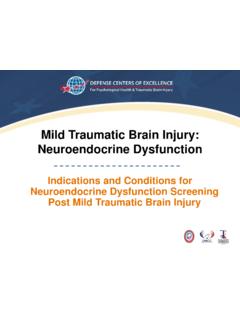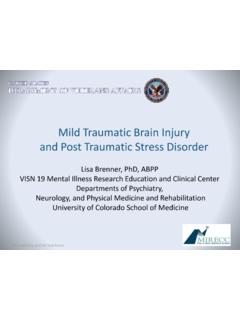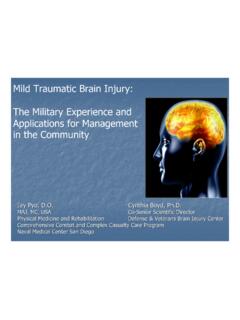Transcription of Mild Traumatic Brain Injury – Case Report
1 Journal of Psychology and Clinical Psychiatry mild Traumatic Brain Injury case Report Abstract case Report A mild Traumatic Brain Injury or a concussion represents the majority of all Volume 3 Issue 1 - 2015. Traumatic Brain injuries. The consequences show on physical, cognitive, and emotional functioning and even though the Injury classifies as mild , it can have a Ur a i man taba1* and Karmen Resnik2. significant effect on a patient, patient's family and their quality of life. Defects are 1. Traumatic Brain Injury rehabilitation department, University often overlooked as objective clinical methods are lacking. Neuropsychological Rehabilitation Institute So a, Slovenia evaluation can aid in appraisal of the defect magnitude and determine factors 2. Private employed, Slovenia that influence the outcome of the injured. The following case Report addresses the importance of neuropsychological evaluation in treating cognitive defects *Corresponding author: Ur a i man taba, Principal along with the Cognitive Behavioral therapy approach toward emotional and Investigator, University Rehabilitation Center So a, behavioral disorders treatment in mild Traumatic Brain Injury .
2 It has been Linhartova cesta 51, 1000 Ljubljana, Slovenia, Tel: (01) 475. shown how important it is to find possible causes for slow recovery. The annuity 81 00; Email: tendencies have been noted as an important factor for prolongation of the post- concussion syndrome. We can detect the symptom simulation with appropriate Received: March 30, 2015 | Published: June 01, 2015. psychological instruments. Described is a case of 38-year-old man who suffered a mild Traumatic Brain Injury . Keywords: mild Traumatic Brain Injury ; Neuropsychology; Neuropsychological assessment; Cognitive re-habilitation; Cognitive behavioral therapy Abbreviations: TBI: Traumatic Brain Injury ; PCS: Post- accidents, falls and sport activity injuries. At higher risk for a mild Concussion Syndrome; GCS: Glasgow Coma Scale; CBT: Cognitive- TBI are younger and older people, men, minorities, people with Behavioral therapy lower socioeconomic status, and people with addictions. Introduction Symptoms Basic features of the mild Traumatic Brain Injury A mild TBI classifies when a head Injury is accompanied by a loss of consciousness or dizziness in the time of Injury , posttraumatic A mild Traumatic Brain Injury (TBI) is a worldwide health amnesia for less than one day, with Glasgow Coma scale (GCS).
3 Problem as it represents 70-90% of all registered Brain injuries higher than 13, and negative results in neuroimaging diagnostics. with a prevalence of 100-300 per or even 600 per The patients who suffer a mild TBI show emotional, cognitive, people [1]. The mild TBI, also referred to as concussion , behavioral and physical symptoms, which occur separately or mild head Injury , mild Brain Injury [2] is one of the most in combination and effect the individuals' functioning. The most prevailing diagnoses among nervous system dysfunctions [3,4] common symptoms are a headache, dizziness, nausea, memory with a significant portion of the injured who suffer long-term problems, fatigue, irritability, anxiety, insomnia, concentration consequences. The most prevalent symptoms soon after the difficulties, and light and sound sensitivity [15]. Occurrence Injury are a headache, fatigue, dizziness and irritability. Other and perseverance of the cognitive symptoms after a mild TBI. often present symptoms include light sensitivity and/or sound significantly influence the reintegration to the professional, sensitivity, attention and con-centration difficulties, memory academic and social activities [16].
4 Despite the classification problems, slower information processing, depression and among of the Injury as mild , the consequences can be persistent and less likely to occur also a foggy or double vision. The symptoms persevering. The possible cognitive deficits that occur post- usually clear after 3 months [5-7] whereas in some cases insist for trauma express in form of attention, concentration, processing a prolonged period [8-13]. A mild TBI rehabilitation is relatively speed, memory, and executive functioning problems [17,18]. swift and the injured return to their normal, pre- Injury functioning. In acute phase of the Injury Brain 's metabolic activity changes However, 25-30% of patients Report symptoms between 3 to 6 and perfusions most commonly occur in the prefrontal cortex, months after the Injury and in 10-15% of the cases, the problems reflecting on the impaired executive functioning [19]. The persist even longer [14]. In those cases, we talk about a chronic expected cognitive symptoms rehabilitation takes from one week post-concussion syndrome, which significantly effects patient's to 6 months whereas young athletes recover significantly faster life at home, and in social and occupational contexts [15].
5 In the [20]. At this point it is not clear whether persisting cognitive latter, it posts significant monetary problems for the individual and symptoms come from the pathophysiological background of the society due to frequent absenteeism. In cases where symptoms Injury or from other factors that could also influence cognitive persist even after 3 months the longitudinal effects of the mild TBI functioning; for instance pain, fatigue, drugs, sleeping, pre- are expected [10]. mild TBIs are often under diagnosed as there morbid personality factors, legal claims, psychological factors are no objective clinical diagnostic methods available and patients or emotional disturbances [21,22]. The cognitive sump-toms often feel misunderstood which often enhances the simulation of directly linked to the Injury typically do not deteriorate with time. the symptoms and has a significant impact on the satisfaction When the cognitive functioning problems persist after 3 months, and quality of life. The most common causes of mild TBI are car a neuropsychological evaluation is recommended.
6 Submit Manuscript | J Psychol Clin Psychiatry 2015, 3(1): 00116. Copyright: mild Traumatic Brain Injury case Report 2015 taba et al. 2/7. Post-concussion syndrome information in reporting patient's cognitive and behavioral changes. A post-concussion syndrome develops after TBI regardless of the intensity of the Injury . It is generally noticed that post- Based on information gained with the clinical interview, concussion symptoms along with a headache, dizziness and patient's medical files, and medical diagnosis the attention deficits result from neurophysiological influences. neuropsychologist decides on cognitive and emotional aspects However, the persistent and long-term symptoms are harder to that need to be addressed and what test battery should be used. explain. The pre- Injury and post- Injury psychological factors Most neuropsychologists use flexible test battery modified for significantly influence the persistence and exaggeration of the every individual based on alleged impairments of cognitive, symptoms.
7 Stressful life events, poor coping strategies, depression emotional and behavioral functions [29]. The neuropsychological and individual fragility influence the psycho-genesis of the post- evaluation for patients who suffer a mild TBI is more complex concussion syndrome, though concrete and objective evidence and detailed than merely using a screening test. The use of the are limited [23-25]. latter is appropriate when the patient is acutely ill or behaviorally problematic. However, in most cases the evaluation is wholesome Numerous studies focused on potential demographic and usually lasts 4 to 5 hours. The detailed inspection is more influences, preexisting variables, and premorbid factors that so needed when a patient complains about various cognitive influence rehabilitation. The risk for slow rehabilitation is higher functioning problems or when the clinical picture does not fit for persons with pre- Injury problems such as addiction and lower the nature of the Injury . Veltman and colleagues [30] evaluated psychosocial adaptation abilities [22].
8 Long absenteeism and 166 patients with mild TBI in the acute phase with a screening social withdrawal additionally effect personal devaluation and test and retested them in a later stage. The results showed that significantly alter emotional functioning. Some studies revealed screening tests significantly accurately predicted the poorer that older (above 50) people are at higher risk for symptom recovery. The authors suggest that cognitive evaluation is useful pervasiveness than those affected at younger age [25-27]. Many in the early stages of the Injury as it has a predictive power to other factors can have an important role in recovery. For instance, categorize patients with a poorer expected outcome. individuals whose work require higher cognitive abilities are often slower to return to their pre- Injury functioning level. Work Cognitive and emotional assessments usually included environment that requires multi-tasking, fast decision making, in the neuropsychological evaluation of a mild TBI are priority assigning and high level of mental flexibility may pose as following (31-35).
9 Difficulties for an individual who experienced a mild TBI. Other post Injury factors, which de-lay recovery, are a financial pressure, Intelligence: It is very important to determine the intelligence family members' indifference, chronic pain, looking for someone level, which needs to be taken in consideration in further to blame for the accident, and resentment or anger in relation to neuropsychological evaluation. Evaluating individual's intellect accident. The rehabilitation can be additionally delayed because with a standardized test allows us to assess his pre-morbid of the litigations or annuity tendencies. Some studies show functioning and evaluate whether his post- Injury intellectual that symptom pervasiveness is present equally in patients who abilities are affected. underwent the litigations and those who have not, while other Attention: One of the key assessments in mild TBI is assessment show significant positive relationship between pervasiveness and of attention. Attention deficits can significantly influence the exaggeration of the symptoms and litigations [9,25,28].
10 Functioning of other cognitive abilities and can express as an Psychological Consequences overall dispersed and hindered functioning. Evaluation of the deficits in focused, selective, alternating, divided, and sustained Higher cognitive function impairments attention can help us understand why a patient cannot follow the conversation, school lecture or perform in noisy and disturbing Neuropsychological evaluation can help us diagnose cognitive surroundings. The problems usually arise when attention needs and emotional disturbances and plan treatment and rehabilitation. to be alternated between different stimuli and tasks. For instance, Neuropsychological evaluation starts with the clinical interview, a patient could burn the food while cooking because he cannot where we gain in-formation about basic health and psychological divide attention between cooking potatoes on a stove and anamnesis, highest formal education level of the individual, preparing vegetables for a salad. presence of pre-morbid learning difficulties, existence of past head injuries and finishes with a detailed evaluation of a cognitive Memory: Evaluation of the memory normally includes assessment and emotional state.
